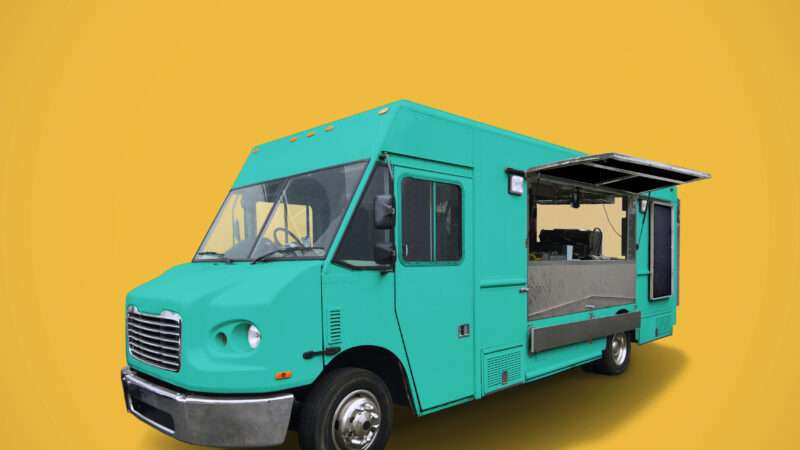
Record food and fuel prices and ongoing supply-chain issues are causing many of the same problems for food trucks that brick-and-mortar restaurateurs, grocers, and consumers now face. Coupled with the impact of rising crime rates, those issues have caused some truck operators to cut back on their operations, Trib Live reported last week, with some, for example, electing to vend only at high-density events where customers are plenty in number.
In Denver, large numbers of food-truck customers are the problem—at least according to city police. And officials’ claims of rising crime leave many food trucks caught in the middle. As Reason’s Fiona Harrigan reported in August, Denver police moved to bar food trucks from operating in the Lower Downtown (LoDo) section of the city, popular with late-night revelers, after a shooting on July 21. Denver police shot a man seen fighting outside a popular beer hall at 1:35 a.m. The man, 21-year-old Jordan Waddy, had a gun that he dropped on the ground while putting his hands up in response to police. Denver police shot Waddy and six innocent bystanders in the crowd near the beer hall.
How exactly is a police shooting the fault of food trucks? And why, many of their operators wonder, is the city “punish[ing] vendors who have nothing to do with violence”? While those are the right questions to ask, the Denver Gazette reported last week that the city has moved to restrict most food truck operations in LoDo on Friday and Saturday nights for the next six months. Denver police, for their part, claim the restrictions were in the works before they shot six unarmed people.
While police violence is a concern for food truck owners in Denver, in other cities the challenges faced by food trucks are more familiar. For example, in Long Beach, California, the Press-Telegram reported last week, the city council may decide, boldly, to “simplify and consolidate regulations governing the trucks and—eventually—create rules about where food trucks can operate.”
As the paper explains, various city departments—including health, business, and permitting—currently regulate food trucks in the city, independent of each another. While the city is looking to streamline that process, it’s also planning to add new requirements. One new rule would require food trucks to obtain a city health department permit in addition to the existing county permit. The report also notes a plan to discuss new rules with “stakeholders,” including not just food trucks and residents but also brick-and-mortar restaurants, which raises the familiar threat of rules that would protect brick-and-mortar restaurants at the expense of food trucks.
In Spanish Fort, Alabama, near Mobile, city planners have recommended allowing food trucks to operate in the city, where they’re currently banned. But one city council member, Carl Gustafson, Jr., openly admits he’s opposed food trucks operating in the city because he wants to protect the city’s brick-and-mortar restaurants.
“So, it was out of an abundance of respect for the people that have invested money in Spanish Fort in brick-and-mortar restaurants we didn’t want to have a lot of competition coming in against them and setting up right across the street,” Gustafson told NBC 15 last week. “I think we need to maintain a healthy respect for them and their invest[ment] in Spanish Fort by setting a distance parameter that the food trucks are allowed to go within a certain distance.”
While officials in Denver, Long Beach, and Spanish Fort are making a mess for food truck owners and their customers, Seattle lawmakers are bucking that trend. The city council is looking to make permanent many of the improvements they introduced in food-truck regulations during the pandemic, My Northwest reported last week.
As the report details, Seattle introduced regulations on food trucks in 2011. Those rules stunk. Trucks couldn’t park near any brick-and-mortar restaurant, school, or park, My Northwest notes. Food trucks were also prohibited from parking in most areas of the city and were limited from parking near other legally parked food trucks. During the pandemic, though, the city relaxed those idiotic rules, “removing restrictions on distances from permanent locations, schools, and parks and restrictions on the number allowed on each block.” It’s those good, new rules the city is looking to adopt permanently.
Though food trucks today still face evolving challenges—from inflation to violence—many of the greatest threats to the industry’s existence and growth continue to take the form of regulations that would hamper their success even in the best of economic climates.Since the pandemic’s early days, I’ve written dozens of columns—as here—in which I’ve identified many needlessly burdensome food regulations governments had chosen to lift or relax temporarily. Seattle’s pitch to make permanent the looser, Covid-inspired food-truck regulations the city implemented early in the pandemic is a welcome development. Denver, Long Beach, Spanish Fort, and other cities and towns that treat food trucks like crap are hurting their own food scenes, residents, and economic recoveries.
The post Food Trucks From Colorado to Alabama Are Still Struggling With Red Tape and Protectionism appeared first on Reason.com.
from Latest https://ift.tt/Qd7qnHp
via IFTTT